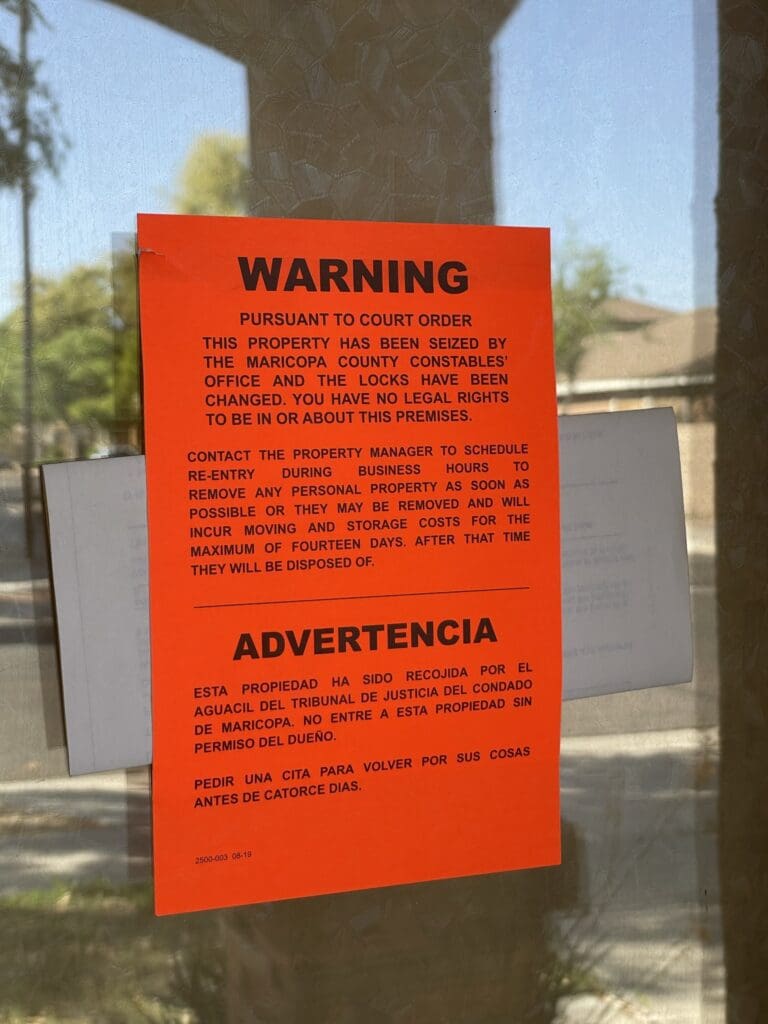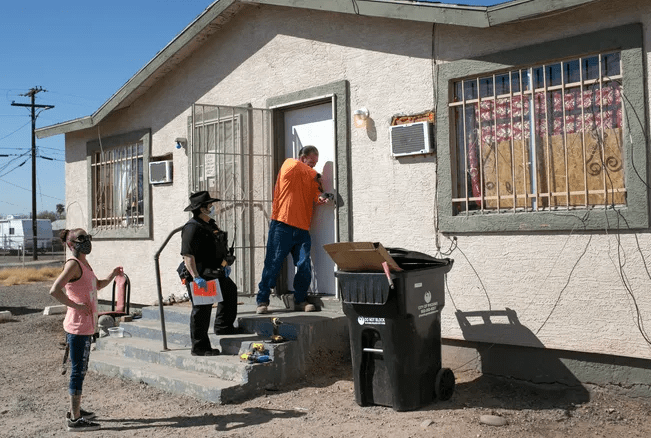Once an eviction judgment in obtained, an Arizona tenant has 5 calendar days to vacate the property. If the tenants do not voluntarily vacate within the 5 days, then an Arizona landlord can file a Writ of Restitution. The Writ of Restitution orders a constable–similar to a sheriff–to remove the tenants from the Property.
Upon arriving to the rental property, the Constable will let the tenants know that they have, anywhere from a few minutes to a few hours to vacate the Property. The tenants will have enough time to pack a bag of their essentials and leave. Whether it’s by reason or force, the tenants will be leaving when the constable orders.

When Will the Constable Execute the Writ?
When will the constable visit the rental property and actually remove the tenants? It’s impossible to give a precise estimate and the timeframe can vary wildly. When the Writ of Restitution is initially filed with the court the filing clerk must take the paperwork to the judge for his/her signature. Once signed by the judge it is delivered to the Constable. Sometimes, a judge may be busy or out of town and the Writ sits on their desk for days before it is signed.
Once the Writ is signed then it is delivered to the Constable for execution, and this can be another delay in the process. Most justice courts only have one Constable. So, if the Constable is on vacation, sick or receives a large number of Writs at the same time then it can take as long as two weeks before he is knocking on the property door! Though it usually takes 6 to 9 days for the Constable to actually show up to the rental property.
Changing the Door Locks
It is strongly advised that the door locks are changed once the tenants have been removed by the constable. Ideally, a locksmith can go to the property at the same time as the constable and immediately change the locks. Sometimes, a constable is not able to communicate with the landlord prior to executing the writ of restitution. In these situations, send the locksmith to the rental property just as soon as possible.
In the picture below, you can see the constable, locksmith, and property owner all present during the execution of the writ.

How To Know If The Tenants Have Vacated?
There is no “scientific” way of knowing whether or not the tenants have left. Typically, by this point the tenants are not contacting the landlord and so they are not going to send an email or text informing the landlord they have left the property.
If a landlord lives near the rental property, then I recommend driving by–but do not make contact with the tenants–and look to see if there are signs that they are moving. For example, is there a moving truck in the driveway? Are people carrying out boxes? If you drive by at night are the cars gone and lights turned off?
Or, conversely, when you drive by the rental property are cars in the driveway and lights on in the house? If so, this is a good indication that the tenants have not left and have no intentions of leaving.
What If the Tenant Returns?
It is a Class C misdemeanor for an Arizona tenant to return to the rental property after they have been removed by the constable. Of course the tenant can return with the landlord’s permission but if you are a landlord and the tenants return without your permission then call the police. Do not confront the tenants.
What If the Tenants Leave Behind Their Belongings?
If the tenants leave behind their belongings, then an Arizona landlord must maintain the tenant’s belongings for a minimum of 14 days from the date the Writ of Restitution is executed. Click HERE to learn more about the 14-day process.
If you are an Arizona landlord and would like to know more about Writs of Restitution, then call the Dunaway Law Group by phone at 480-702-1608 or message us HERE.
* The information provided is informational only, does not constitute legal advice, and will not create an attorney-client or attorney-prospective client relationship. Additionally, the Dunaway Law Group, PLC limits its practice to the states of Arizona and New York.
